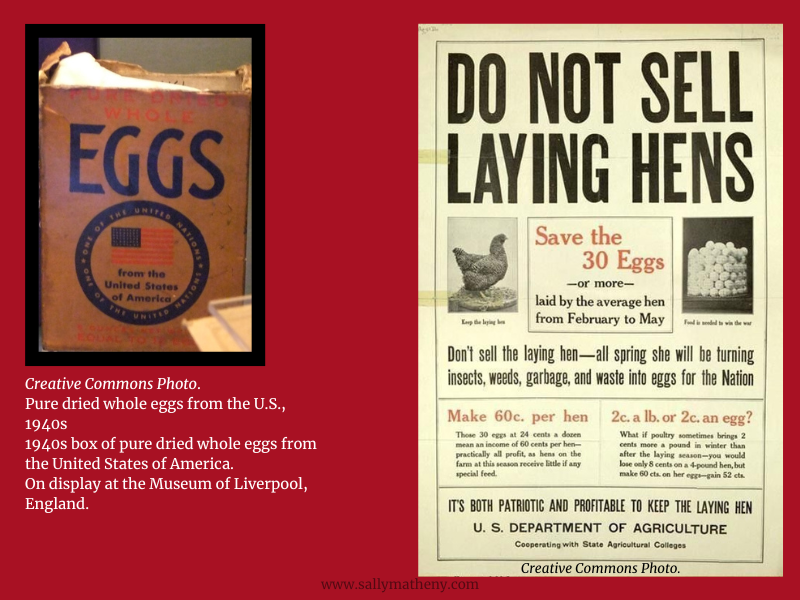
Egg Shortages: Helpful Tips We Can Learn from WWII
Do the egg prices and shortages have you in a tizzy? Stay calm and read on. There are several things we can learn from the folks who lived during the WWII era.
Challenging times provide opportunites to teach the younger generation the value of learning history. Quite often, we discover helpful information relevant to our current situations.
At the time of this writing, Hawaiians are paying almost ten dollars for a dozen eggs. Florida is pushing seven dollars; but the average price for eggs in the U.S. is hovering around six dollars a dozen.
Whether it’s due to disease or other factors,one report estimated over 58 million poultry have been lost in the United States since February 2022.
Whatever the reasons, we’re feeling a pinch in our nest eggs.
Of course, this isn’t the first time there’s been a crack in the egg supply. Let’s look back and learn how Great Britain survived on less eggs during 1941 -1947.
Rationed Eggs in the 1940’s
In the 1940’s, the rationing of food took place all over the world. Back then, it wasn’t due to an avian flu or inflation. There was a war going on. Depending on where you lived, determined how easily you could access eggs.
Even though eggs were not rationed in Ireland, they were challenging to find, especially if you lived in a city. Hence, they were used as a treasured commodity for trading.
In Great Britain, eggs were rationed from 1941- 1947. And, the war ended in 1945. Most citizens had an allotment of one egg per week. Therefore, they resorted to several tactics to make do with what they had.
How to Manage with Limited Eggs
Whether it’s due to rations, shortages, or just high prices, there are several things we can do when eggs are in short supply.
Stretch the Eggs
Look no further than a cookbook from the early 40’s and you’ll learn how people stretched their eggs. There are a variety of other egg substitutes you can use such as applesauce; mayonaise, and baking soda with vinegar, just to name a few.
Since the price of eggs has skyrocketed, one thing I’ve been doing a lot more of is using the refrigerated, liquid egg substitute in my baking recipes. There’s no difference in the taste, especially in baked goods. The last carton of liquid substitute I bought a few weeks ago rendered individual servings which cost almost half the price of a whole egg. But, I noticed the price is beginning to creep up on the liquid substitute as well.
Another substitute is powdered eggs. They were greatly used during WWII. They’re popular today with preppers because of their 5 – 10-year shelf life. However, my research shows powdered eggs today cost as much, if not more, than fresh eggs—unless you currently live in Hawaii. (Remember? Ten dollars a dozen!)
Another way to stretch our fresh eggs is with add-ins. According to Frugal SOS, one way to stretch scrambled eggs, is by adding flour and milk. For example, mix six eggs with 4 tablespoons of flour to 1/3 cup of milk until smooth. Then, scramble as usual.
I remember my MawMaw making the best hamburgers. I loved the taste and the moist texture. Her secret ingredient was bread crumbs. No doubt, she learned this stretching technique from living through the WWII era. I’ve not tried it yet, but I’ve read you can add bread crumbs to scrambled eggs, as well.
When making omelets, get creative with added ingredients. Originating in 1937, SPAM became the go-to meat during WWII. Homemakers and military personnel alike learned how to incorporate the spiced, canned ham into their meals. Since SPAM has remained a favorite food of the locals in Hawaii since WWII, perhaps extra portions are being utilized now until the egg prices come down. Of course, meat prices are rising as well, so creativity is still in order.

Create Some Fun
Frugality doesn’t have to be a drudgery. Have fun with the kids and try something new while stretching those eggs. Watch Ree Drummond’s 3-minute Food Network video of how to boil an omelet in a bag.
Furthermore, if the kids are already thinking about decorating Easter eggs; be sure to hide the inedible ones, and refrigerate the real treasures for eating!
Raise Chickens
We’ve raised backyard chickens for years and love the fresh eggs. Our kids first learned how to raise chickens when they were involved in 4-H, but you can easily find helpful books and information online as well.
Backyard chickens are becoming popular in my community. I’ve seen a considerable increase in people’s yards this past month. The price for live chickens is increasing, too. So, you may not want to wait until spring to pick up those cute chicks at your feed and seed stores.
You may be thinking even though chickens will provide “free” eggs, there is still the cost of chicken feed. There are ways to make that stretch as well. Check out the Fresh Eggs Daily blog for 12 Ways to Save Money on Chicken Feed.
There are also different methods for devising safe chicken coops out of inexpensive materials or items you may already have on hand. Let Pinterest be your springboard for ideas.
Remember to Share
No matter what you do to navigate through a shorter, or more expensive, egg supply, remember to share with others.
Not only share what you’ve learned from history, but also, what you’re doing now that others might find helpful as well. Do you know a local farmer selling eggs for a great price? Try a new, egg-stretching recipe? Tell somebody!
Perhaps you’re raising chickens yourself. Consider sharing with others. When we are enjoying an abundance, sometimes we forget there are many who are not.
For several years after World War II ended, British citizens, including the beloved writer, C.S. Lewis, endured continued rationing by the British government.
In The Completion of C.S. Lewis, the author, Harry Lee Poe, explains how America came to the aid of Great Britain by sending CARE (Cooperative for American Remittances to Europe) packages. This is the origin of what we call “care packages” today.
C.S. Lewis, his family, and his friends were recipients of those CARE packages. Letters written by C.S. and his brother express their deep gratitude for the food sent to them from total strangers in America. Lewis wrote of sharing the canned hams and other foods he received with his writing group, the Inklings, and with those in greater need.
In 1947, his brother, Warnie Lewis, wrote a letter expressing how “he never dreamed the time would come when he’d go to bed hungry.” He was amazed when a woman sent them bacon and eggs.
Just this week, I read about a bakery in Connecticut, who for a short time, is giving free eggs to customers who purchase of a cupcake or cookie. They’re also donating the proceeds they make during that time to a local women’s shelter.
We may never fully know the impact it makes when we extend kindness (and eggs) to someone in need. Share with others as you’d want them to share with you.
So, gather wisdom. Learn how to adapt with what you have. Consider raising chickens. Or, maybe make a friend in Missouri. Right now, they are the state offering a dozen eggs for the lowest price!
Whatever you do, don’t worry. The sky is not falling, and we need to convey that to our children. Keep calm, and carry on.
More Activities and Resources
If you homeschool, or would just like to learn more yourself, I’ve created free printables with additional activities. You can locate those under the “Resources” tab or request them via email on the “Contact” page.
Sources:
Bitter, Alex. “If You Live in One of These States, You’re Spending Way Too Much on Eggs.” Business Insider, Business Insider, 22 Jan. 2023, https://www.businessinsider.com/these-states-have-seen-the-highest-increases-in-egg-prices-2023-1.
Schnirring, L. “Avian Flu Strikes More Poultry in 6 States as Virus Found in Dead Seals in Russia.” CIDRAP, 24 Jan. 2023, https://www.cidrap.umn.edu/avian-influenza-bird-flu/avian-flu-strikes-more-poultry-6-states-virus-found-dead-seals-russia.
Home Front Handbook. Imperial War Museum (Ministry of Information). 2005 [1945]. ISBN 1-904897-11-8.
Courtney, Tina (April 1992). “Veggies at War”. The Vegetarian. Vegetarian Society.
Archived from the original on 18 February 2010. Retrieved 19 July 2009.
Poe, Harry Lee. “The Dreary Aftermath of War.” The Completion of C.S. Lewis: From War to Joy (1945-1963), Crossway, Wheaton, IL, 2022, pp. 28–35.

A freelance writer, Sally Matheny’s writing is published in worldwide, national, regional, online and print publications
Sally focuses on the power of story, history, and His Story to tell the next generation wondrous things. Connect with her on various social media sites. But, if she’s not hanging out with family and friends, or engaging in an American history class, you’ll most often find her at SallyMatheny.com or Pinterest.





6 Comments
Tami Smith
Sally, I really enjoyed reading about the rationing that took place during ww 11. Very interesting some of the things that were used to help feed people.
Sally Matheny
Hey, Tami! I’m glad you enjoyed it. I always find the resilience of people inspiring–and those who lived during the 1940’s certainly showed fortitude and resourcefulness.
Kathy
Sally, I loved this combination of history and ways to stretch our eggs during this time of eggflation! I had no idea Britain’s rationing lasted until 1947, or that C.S. Lewis and his brother recieved care packages or even that CARE was an acronym! I love learning such interesting history! Thank you for such an interesting and helpful post!
Sally Matheny
Kathy, so many lives were affected during the 40’s, we’ll never run out of stories. It seems I discover something new about that era every time I research.
J.D. Wininger
With a large supply of powdered milk, powdered eggs, and other essentials on hand, we’ll weather this storm, and I think the much worse ones coming, for as long as God chooses. And yes, I’m soon to be adding chickens to the mix here at our ranch. Guinea hens actually.
Sally Matheny
Hi, Mr. J.D., I think with every adversity, we grow a little stronger and a little wiser for the next storm. At least, I hope so. So glad to hear about your chickens! I look forward to seeing how they inspire your blog posts. 🙂 We love our fresh eggs. We haven’t mustered enough courage to try raising a cow, yet.